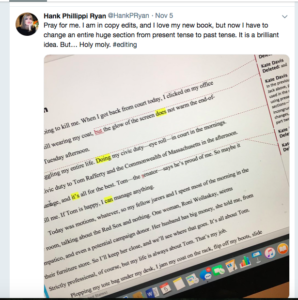 My husband, Joe, bought these gorgeous roses for me. He thought they would brighten my week as I plowed through another set of edits, revisions and changes.
My husband, Joe, bought these gorgeous roses for me. He thought they would brighten my week as I plowed through another set of edits, revisions and changes.
What! you say. More edits? More revisions? Are you kidding me? Didn’t you just sign with a literary agent?
Indeed, I did. And, I blogged about it a couple of weeks ago when I signed with Paula Munier of Talcott Notch Literary Services. What I didn’t say at the time (because, saving tidbit for this blog) was that Paula’s offer of representation came with the suggestion on condition that I make certain changes to my manuscript.
Edits, Revisions & Changes
I wasn’t surprised. I had a good idea of one change I’d probably have to make as far back as November last year when I saved this Tweet (screenshot below) from bestselling author Hank Phillippi Ryan.
In case, it’s too small to read, the tweet says , in part, “I am in copy edits, and I love my new book, but now I have to change an entire huge section from present tense to past tense… Holy moly.”

Holy moly is right, I thought — when I saw that tweet. I bet I’m going to have change my tenses, too. By the time January rolled around, I definitely knew I was going to be making those changes after I read this post written by Paula on the Career Authors website.

Risky Moves?
So, what are the risky moves — and, we’re talking in commercial/genre fiction here? Well, let’s just say I made two of Paula’s three “risky moves:”
1) I used the present tense for the chapters written from my antagonist’s point of view (“present tense calls attention to itself, and sets up an expectation of ‘literary’ prose,” writes Paula) and
2) I also wrote my antagonist’s chapters in the first-person while using a third-person POV for my heroine (“When writing first-person POV, stick to one POV per book.”)
Ganging Up On Me
Let me explain: In my novel, I write in two alternating POVs: The female protagonist, Jenna, is written in the third person, past tense: (“She sat down abruptly on the narrow bench. Her hands shook as she remembered the five missed calls.”)
Meanwhile, the antagonist was written in the first person, present tense: (“I’m so deep in thought, I almost sail past a spot that’s opening up across the street from her apartment. I slide in. It’s perfect.”)
My freelance editor, Helga Schier described this as a “very interesting choice,” but wondered why I’d made such a choice. Paula was more direct. In her notation between two chapters switching from my antagonist to heroine, Paula wrote: “weird to use present tense for him and then past tense for Jenna.”
Look, I only need to be told TWICE!!!!! Okay?
Figuring Out My Bad Guy
At this point, however, you may also be wondering why I would choose to write like that in the first place. And, the answer is that “in the first place” my antagonist, like the heroine, was written in third person, past.
BUT, at that stage he was a vague, murky figure. I had no real grasp yet of what kind of a man he was, and what was really driving him. It wasn’t till after I returned from the Algonkian Novel Workshop –where, interestingly enough Paula, and Pulitzer Prize-winning author, Robert Olen Butler asked some pointed questions about this bad guy — that I sat down to really figure him out.
And, in order to do that, to get to know him better and to get into his devious mind, I wrote all his chapters from his first person perspective.
It was a lot of fun, let me tell you.
In Good Company
 But no problem, it was only 27 chapters to re-write! And, it’s done, now. Also, it should be noted, I am in good company when it comes to authors who rewrite at the behest of agents and editors.
But no problem, it was only 27 chapters to re-write! And, it’s done, now. Also, it should be noted, I am in good company when it comes to authors who rewrite at the behest of agents and editors.
In an honest and illuminating blog, titled How Many Drafts Did You Do Of Your Book? Catherine Ryan Howard wrote that she spent 6-8 weeks on a re-write after she signed with her literary agent. And, then another week after her draft was returned to her by the agent. Earlier this year, Howard’s second thriller, The Liar’s Girl was nominated by the Mystery Writers of America for an Edgar for Best Novel.
 Lisa Jewell is another bestselling author who has written about making major changes to her psychological thriller, Then She Was Gone. In a blog for a British bookseller, Jewell wrote about re-writing the entire ending of her novel after her editors made the suggestion that she had to kill off a major character. Then She Was Gone was in the Top 100 bestsellers of 2018 in the U.K.
Lisa Jewell is another bestselling author who has written about making major changes to her psychological thriller, Then She Was Gone. In a blog for a British bookseller, Jewell wrote about re-writing the entire ending of her novel after her editors made the suggestion that she had to kill off a major character. Then She Was Gone was in the Top 100 bestsellers of 2018 in the U.K.
As Catherine Ryan Howard wrote in her blog : “Some writers don’t like being edited and although this will sound harsh, I’m not sure if those writers really know what writing is about. Being edited is absolutely wonderful. It’s like one-on-one tutoring in how to make your book better.”
Looks like you’re working your tail off. Congratulations again. Having a talented editor and an agent who knows the commercial marketplace and a writer willing to work this hard are the ingredients of one damn good book. Good luck.
Thank you, Greg. And, yes, I think luck is also a big piece of it. We’ll see, and I’ll certainly be posting what happens in the future with my novel.